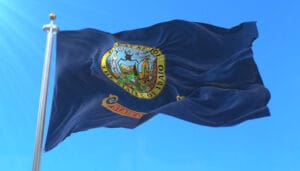Physician assisted suicide legislation has been making the news recently. Legalized euthanasia in Canada, the Netherlands, Belgium, and other European nations have has also generated headlines.
However, a silent, rampant killer is intentionally claiming lives of far more too many patients each day in America’s medical facilities.
This quiet, legal killer is taking the lives of more Americans than all the assisted suicide deaths combined. It’s the withdrawal of food and water from patients whose lives are deemed “futile” by hospitals, nursing homes, and hospices throughout the nation.
Food and water delivered by tube instead of mouth was once deemed “basic and ordinary care,” but is now viewed as “extraordinary medical treatment.” Further, it’s legal in all 50 states to withhold food and water when it will directly result in the death of a patient. [Editor’s note: In Oregon, it is only legal to withhold food and water in a very few instances.]
Terri Schiavo was denied food and water. It took her 13 days to die.
So, how many patients is this likely affecting? According to the American Hospital Association and the Centers for Disease Control, there are nearly 35,000 hospitals, nursing homes and hospices operating in the U.S. — 1.3 million patients in hospice alone. After doing the math, it’s easy to assume that every day patients are being “put down” using this agonizingly cruel, drawn-out death sentence.
Bobby Schindler, president of the Terri Schiavo Life and Hope Network and brother to Terri Schiavo, saw this horror play out in a very personal way with his sister. It took her 13 excruciating days to die. A time period he appropriately describes as a nightmare for Terri and her family.
“My sister’s lips were horribly cracked to the point they were blistering. Her skin became jaundice with areas that turned different shades of blue. Terri’s breathing became rapid and uncontrollable. Her moaning, at times, was raucous, which indicated to us the insufferable pain she was experiencing. Terri’s face became skeletal, with blood pooling in her deeply sunken eyes and her teeth protruding forward. What will be forever seared in my memory is the look of utter horror on my sister’s face when my family visited her just after she died.”
Death with dignity?
How did a compassionate and progressive nation like ours resort to such a barbaric practice in the name of medicine? So-called bioethicist Daniel Callahan planted the seeds of what can be considered “medical cleansing” in 1983. “A denial of nutrition may in the long run become the only effective way to make certain that a large number of biologically tenacious patients actually die … it could well become a non-treatment of choice.”
Brutal and prophetic.
Don’t think you’re immune to the risk of death by dehydration. Laws in 46 states already allow the medical provider — not the patient or family — the right to refuse life-saving or sustaining treatments, including food and water. [Editor’s note: Oregon’s current advance directive, written in the early 1990s, protects dementia patients better than any document in any other state. It prohibits this type of killing. SB 494’s intent would have allowed dementia patients to be starved and dehydrated to death, as is currently happening in states around the nation.]
Over the years, laws have been quietly enacted that prioritize the financial standing of insurance companies and medical facilities over patient autonomy and well-being. Ending the life of a costly patient by dehydration and starvation is an economic no-brainer in this day and age of demanded profitability within medical care. Obamacare has expedited this process.
We have seen examples of patients like Stephanie Packer, a California mother of four, who was denied life-saving treatment where physician assisted suicide is legal, while being offered coverage for a lethal prescription to end her life.
Hospital ethics committees routinely assume full decision-making authority over the treatment of patients when family members disagree on how to proceed. And, medical facilities have effective methods of “treatment” for the biologically tenacious who simply refuse to die.
Ethicists Wesley Smith calls it “termination without request or consent.” It involves offing “futile” patients via the denial of food and water or by using terminal sedation, which administers a heavy dose of morphine or other pain killer, whether it’s needed or not, to slow respiration and cause an early death.
Bobby says the best way to protect yourself is to have a legally designated advocate as your power of attorney who will vigorously fight for you. There are free resources that can help protect you and your family.
[Editor’s note: Oregonians can visit www.ortl.org/advance-directives-polst or www.oregon.gov/DCBS/shiba/Documents/advance_directive_form.pdf.]
[This column by Bradley Mattes, President of Life Issues Institute, was posted online on April 19, 2017 at www.lifeissues.org.]




